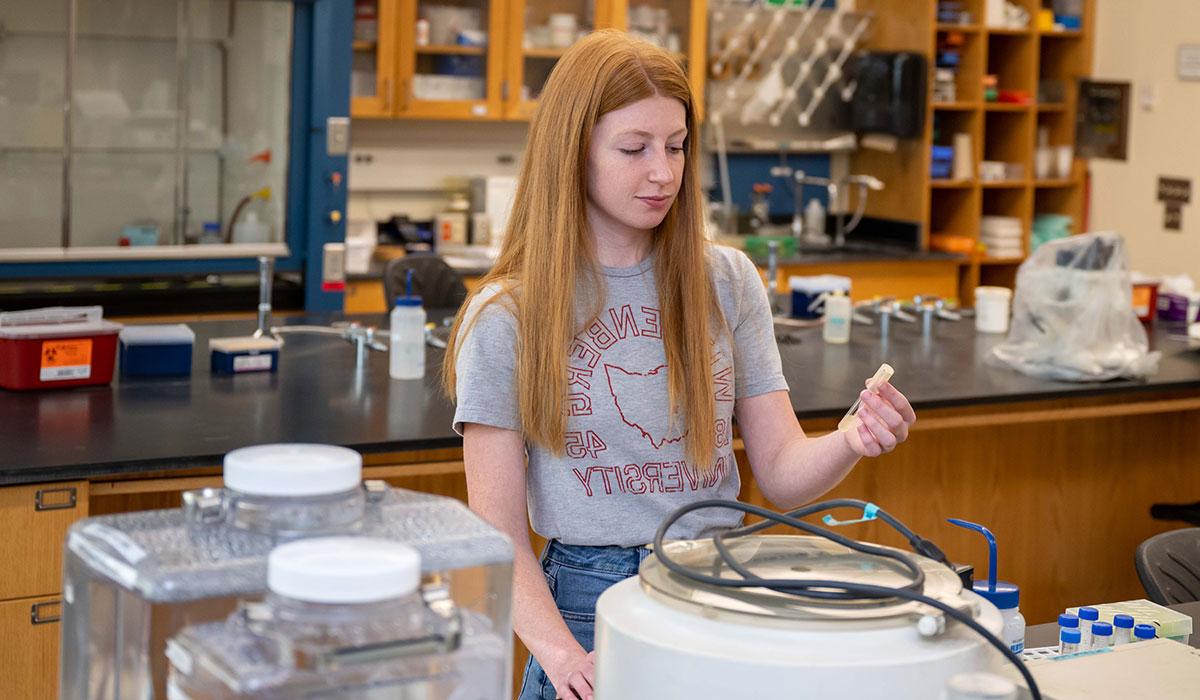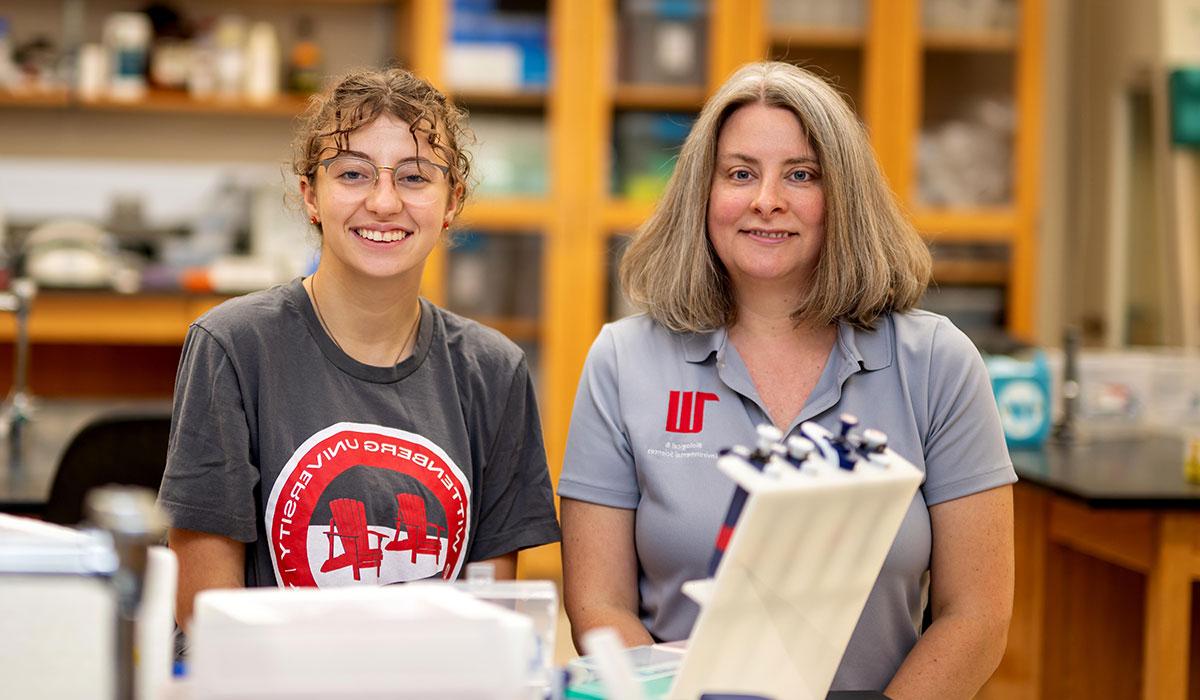Featured Research Projects
 Studying Positrons
Studying Positrons
Leonardo Juarez ’26 worked with Professors of Physics Paul Voytas and Elizabeth George to study antimatter particles called positrons, which are best known for being used in medical PET scans. “The goal of our experiment was to get a better understanding of the differences between matter and antimatter, hoping to help solve the mystery of why antimatter is so rare in the universe,” George explained.
 Investigating Antibacterial Agents
Investigating Antibacterial Agents
Paige Rudolf '25 and Andy Dozal '26 studied under the direction of Daniel Marous, associate professor of chemistry. Both are chemistry majors and worked on investigating antibacterial agents. Rudolf investigated the antibacterial strength of combining essential oils and during that process, she learned that she’s smarter, more determined, and more passionate than she thought she was.
 Researching Heavy Metals
Researching Heavy Metals
Derek Stinefield ’25 and Alex Callahan ’25 studied with Stephanie Eveland Parrot, assistant professor of chemistry, to investigate the effects of heavy metal substitution in the gemstone corundum. “Our research used open-source software called Quantum Espresso to investigate the role of post transition metals in the stability and structure of metal-doped Corundum-type minerals,” Eveland Parrot said.
 Measuring Fringe Trees And Chocolate
Measuring Fringe Trees And Chocolate
Maddie Pawlak '26 and Victoria (Pip) Pipinich '25 studied with Ray Dudek, professor of chemistry. The two of them measured the seasonal production of oleuropein (an insecticide) in fringe trees, and Pipinich measured the amount of lead and cadmium in dark chocolate as her summer project. “Getting the opportunity to explore Springfield with my classmates and growing closer to the chemistry department was what I enjoyed most with this summer research,” Pipinich said.
 Learning At The Intersection Of Philosophy And Psychology
Learning At The Intersection Of Philosophy And Psychology
Guille del Rio Gonzalez '24 recently worked with Kelley Annesley, assistant professor of philosophy, on a research project that touches two academic subject areas. Del Rio Gonzalez and Kelley Annesley conducted research that works at the intersection of philosophy and psychology, a place where the student has been exploring questions about the relationship between empirical studies of character and virtue and the ethical concept of virtue.
 Measuring Workshop Effectiveness
Measuring Workshop Effectiveness
Grace Carter '24 studied with Justin Houseknecht, professor and chair of chemistry, measuring the effectiveness of a workshop facilitating the teaching of organic chemistry. “Grace’s project aimed to measure the effectiveness of the NSF-sponsored Active Learning in Organic Chemistry faculty development workshops at changing participant knowledge, beliefs, and implementation of evidence-based instructional practices,” Houseknecht said.
 Publishing Biblical Literature Research
Publishing Biblical Literature Research
McK enna Boling '24 recently studied with Travis Proctor, assistant professor of religion, on a joint publication. “McKenna wrote a short research essay on the 'Watchers,' a group of fallen angels featured as part of ancient Jewish and Christian mythologies that, pending peer review, will be published on Bible Odyssey (http://bibleodyssey.org/), a public-facing collection of scholarly essays on the Bible run by the Society of Biblical Literature, the leading professional organization for scholarship on the Bible," Proctor said.
 Examining tRNA
Examining tRNA
William Westermeyer ’26 collaborated with Kunal Chatterjee, assistant professor of biology, on a special class of biomolecule called tRNA. “tRNA are required by cells to make proteins. William is trying to learn what happens when tRNA are not properly made – are they repaired and/or destroyed? He is also trying to discover the proteins that participate in this tRNA quality control mechanism,” Chatterjee said.
 Detailing The Urban Heat Island Effect
Detailing The Urban Heat Island Effect
Deza Frega ’24 partnered with Stacy Porter, assistant professor of environmental science, to quantify the urban heat island effect in Wittenberg’s hometown of Springfield and determine its possible influence on precipitation. “Cities tend to be warmer than outlying rural areas, and we’re curious if that additional heat from cities impacts precipitation,” Porter said. "We have temperature and precipitation gauges around the city that we check after every precipitation event.”
 Researching Obsessive-Compulsive Disorder (OCD)
Researching Obsessive-Compulsive Disorder (OCD)
Hannah Marcin '24 conducted research with Michelle McWhorter, associate professor of biological and environmental sciences, to study obsessive compulsive disorder (OCD). Marcin’s summer project looked for a change in expression of certain genes that are believed to be involved in OCD. She and McWhorter examined any potential changes in gene expression in a mouse model of OCD by using a technique called qPCR, which amplifies and quantifies how much gene expression has occurred.
 Tracking Spotted Turtles
Tracking Spotted Turtles
Biology majors Lily Bonar ’24, Neil Boyles ’26, and Tori Hinkle ‘24 all researched spotted turtles in southwestern Ohio under the direction of Associate Professor of Biology Richard Phillips. Phillips let Bonar, Boyles, and Hinkle run the show. The trio trapped, analyzed data, and tracked the turtles. “Lily, Neil, and Tori are all answering questions about where spotted turtles are in southwestern Ohio, how many there are, and how they use habitat in fens,” Phillips said.
 Examining Dandelion Growth
Examining Dandelion Growth
Sarah Fitterer ’25 collaborated with Matt Collier, professor of biology, department chair, and the 2023 recipient of the University’s top faculty award, to study the impacts of soil iron and manganese exposure on North American dandelion growth. “Specifically, Sarah is examining the impact of soil iron and manganese exposure on dandelion root and leaf biomass and hypothesized that plants exposed to higher metal concentrations will show reduced biomass measures compared to those exposed to lower concentrations,” Collier explained.




 Finding Passion in Native Plants
Finding Passion in Native Plants Studying Positrons
Studying Positrons Investigating Antibacterial Agents
Investigating Antibacterial Agents Researching Heavy Metals
Researching Heavy Metals Measuring Fringe Trees And Chocolate
Measuring Fringe Trees And Chocolate Learning At The Intersection Of Philosophy And Psychology
Learning At The Intersection Of Philosophy And Psychology Measuring Workshop Effectiveness
Measuring Workshop Effectiveness Publishing Biblical Literature Research
Publishing Biblical Literature Research Examining tRNA
Examining tRNA Detailing The Urban Heat Island Effect
Detailing The Urban Heat Island Effect Researching Obsessive-Compulsive Disorder (OCD)
Researching Obsessive-Compulsive Disorder (OCD) Tracking Spotted Turtles
Tracking Spotted Turtles Examining Dandelion Growth
Examining Dandelion Growth